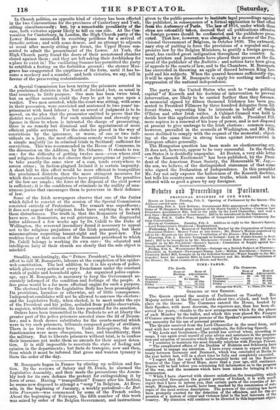The party in the United States who seek to "make
political capital" of Kossuth and his doctrine of intervention to prevent intervention, are likely to be carried farther than they foresaw.
A memorial signed by fifteen thousand Irishmen has they pre- sented to President Fillmore by three hundred delegates from dif- ferent States, requesting him to intercede in behalf of Smith O'Brien and other Irish exiles. A Cabinet Council was held to decide how this application should be dealt with. President Fill- more aspires to a renewal of his lease of power, and is not disposed at present to give umbrage to the Irish electors : common sense, however, prevailed in the councils at Washington, and Mr. Fill- more declined to comply with the request of the memorial ; object, ing at the same time in strong terms against intervention in European affairs generally.
The Hungarian question has been made an electioneering cry. It does not, however, appear to be very successful. In the South. ern States it is decidedly unpopular. At Boston, a very able letter " on the Kossuth Excitement " has been published, by the Presi- dent of the American Peace Society, the Honourable W. Jay,— the son, we believe, of the distinguished statesman of that name who signed the Declaration of Independence. In this pamphlet Mr. Jay not only exposes the hollowness of the Kossuth doctrine, but tells his countrymen some home truths, which could not be uttered with so good a grace by any foreigner.


























 Previous page
Previous page